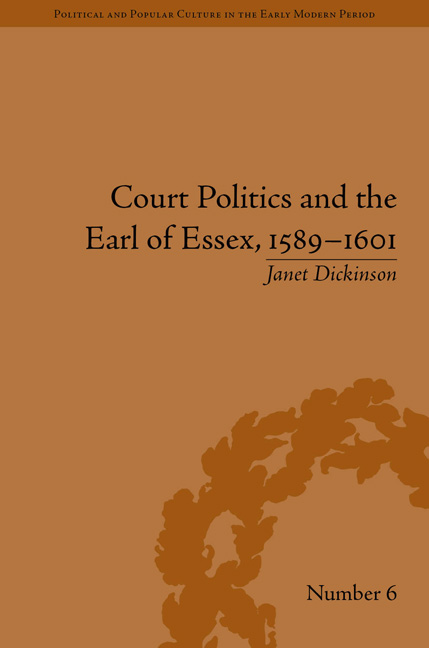Book contents
- Frontmatter
- CONTENTS
- Dedication
- Acknowledgements
- Introduction
- 1 Chivalric Culture and the Earl of Essex
- 2 The Virgin Queen and Her Lovers
- 3 ‘This Late Unhappy Accident’: The Rebellion of 1601
- 4 Faction in the 1590s?
- 5 Essex and Cecil
- 6 Essex and the Essexians
- 7 Elizabeth's Last Decade: Cult or Crisis?
- Notes
- Bibliography
- Index
1 - Chivalric Culture and the Earl of Essex
- Frontmatter
- CONTENTS
- Dedication
- Acknowledgements
- Introduction
- 1 Chivalric Culture and the Earl of Essex
- 2 The Virgin Queen and Her Lovers
- 3 ‘This Late Unhappy Accident’: The Rebellion of 1601
- 4 Faction in the 1590s?
- 5 Essex and Cecil
- 6 Essex and the Essexians
- 7 Elizabeth's Last Decade: Cult or Crisis?
- Notes
- Bibliography
- Index
Summary
For most of them which are accounted the chiefe men of action, I doe intirely love them: they have beene my companions both abroad and at home … I loue them for my owne sake, for I finde sweetenesse in their conuersation, strong assistance in their imployment with mee, and happinesse in their friendshippe, I loue them for their vertues sake, for their greatnesse of minde.
Throughout his life, Essex was closely identified with military men and with martial activities in the support and defence of the Queen and of the country. As Paul Hammer has shown, Essex went to great lengths to fashion a self-image for himself as a military figure, using portraiture, pageantry and patronage. But the set of chivalric values and beliefs that supported and sustained Essex's identity as a nobleman and knight remain relatively unexplored. Chivalric culture provides a vitally important framework for Essex's beliefs and behaviour, but it remains the case that Essex is seen as having set himself apart from the rest of the court by consciously cultivating his martial identity – in short, that he was an anachronism, described mostly recently by Keith Thomas as ‘a dinosaur’. Yet recent studies of the seventeenth century have made it clear that chivalric culture remained important both in personal and political terms, demonstrating just how relevant and significant an element the chivalric ethos was to contemporary political culture.
- Type
- Chapter
- Information
- Court Politics and the Earl of Essex, 1589–1601 , pp. 5 - 24Publisher: Pickering & ChattoFirst published in: 2014

